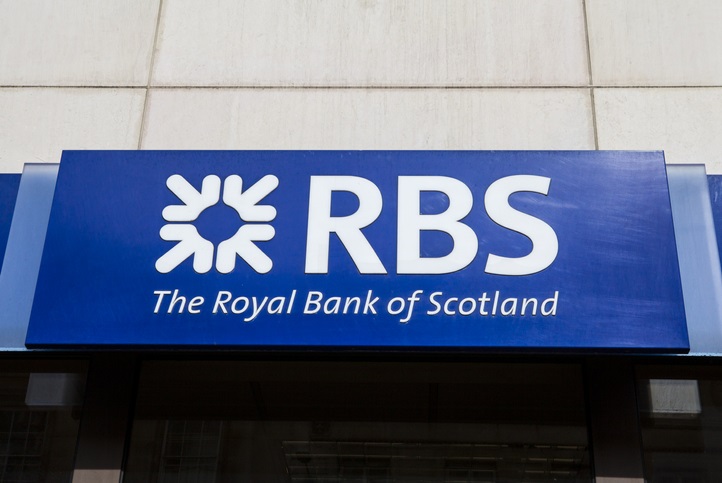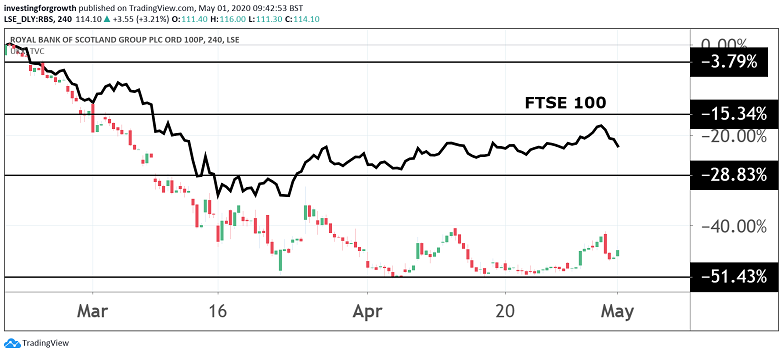Royal Bank of Scotland rallies as FTSE 100 dives again
Despite another savage drop in share prices, RBS is heading higher. Our head of markets explains.
1st May 2020 09:49
by Richard Hunter from interactive investor
Despite another savage drop in share prices, RBS is heading higher. Our head of markets explains.

The universal chorus from banks during this quarterly reporting season has been one of sharply lower profits, largely due to markedly higher impairment provisions. It is therefore unsurprising to see Royal Bank of Scotland (LSE:RBS) in harmony.
For RBS, the impairment increase to £802 million for the first quarter of 2020 includes around £630 million relating to Covid-19 provisions, in addition to the £170 million that was already in place due to potential losses arising from the UK’s departure from the EU.
The bank’s exposure to the SME (smaller companies) segment could prove to be a particular challenge, although the group remains committed to increase lending regardless and has already introduced payment holidays across many of its segments in light of the current environment.
A general slowdown in activity has exacerbated some of those industries which were already in peril, such as retail and leisure, and these sectors have now been joined by casual dining and restaurants.
- Richard Buxton interview: Lloyds Bank's results and dividend optimism
- Ian Cowie: by far the biggest question facing investors now
As a result, pre-tax profit has declined by 48% and net profit by 59%, although the former is comfortably ahead of expectations. As with its peers, much of the increased lending it has seen is largely due to the drawdown of credit lines by companies looking to bolster their own cashflow.
Meanwhile, the Return on Tangible Equity figure has suffered significantly, now running at just 3.6% versus a previous figure of 8.3% and way off the longer-term target of 9-11%.
Net Interest Margin also remains under pressure, especially given the latest cut in UK interest rates.
In the background, the Government stake continues to hang over prospects for the share price, although that is not of immediate concern given other pressing issues.

Source: TradingView Past performance is not a guide to future performance
At the same time, there are also a number of elements of this release which give comfort in underlying the bank’s capital position.
There is a large liquidity buffer which exceeds £200 billion and results in a liquidity coverage ratio in excess of 150%. The capital cushion is one of the highest in the sector at 16.6% and the total income figure for the group exceeded both expectations as well as the year-on-year figure.
Alongside a focus on expenditure, this has resulted in an impressive improvement to the cost/income ratio which, at 57.7%, compares favourably to 59.4% a quarter ago and 63% a year ago.
Within the units, NatWest Markets enjoyed a strong quarter amid the market volatility and posted a gain of 9.3% in core income. At a group level, and stripping out the impairment figure, RBS increased profit from £1.1 billion to £1.3 billion.
- Bank dividend cuts: Top analysts give their opinion
- Take control of your retirement planning with our award-winning, low-cost Self-Invested Personal Pension (SIPP)
The scene is therefore set for the battle ahead, and RBS seems well-positioned. The perceived economic impacts of the outbreak have already scythed through share prices, with RBS having fallen 54% over the last year, as compared to a 20% decline for the wider FTSE 100 index, and 50% in the last three months alone.
At the same time, the bank has clarified its strategy for the difficulties ahead, and a recently improved market consensus of the shares to a “buy” is a reflection that RBS is seen as a rather stronger proposition to the one which limped out of the financial crisis over a decade ago.
Full performance can be found on the company or index summary page on the interactive investor website. Simply click on the company's or index name highlighted in the article.
These articles are provided for information purposes only. Occasionally, an opinion about whether to buy or sell a specific investment may be provided by third parties. The content is not intended to be a personal recommendation to buy or sell any financial instrument or product, or to adopt any investment strategy as it is not provided based on an assessment of your investing knowledge and experience, your financial situation or your investment objectives. The value of your investments, and the income derived from them, may go down as well as up. You may not get back all the money that you invest. The investments referred to in this article may not be suitable for all investors, and if in doubt, an investor should seek advice from a qualified investment adviser.
Full performance can be found on the company or index summary page on the interactive investor website. Simply click on the company's or index name highlighted in the article.